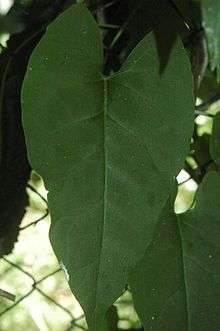Fallopia multiflora
| Fallopia multiflora | |
|---|---|
 | |
| Scientific classification | |
| Kingdom: | Plantae |
| (unranked): | Angiosperms |
| (unranked): | Eudicots |
| (unranked): | Core eudicots |
| Order: | Caryophyllales |
| Family: | Polygonaceae |
| Genus: | Fallopia |
| Species: | F. multiflora |
| Binomial name | |
| Fallopia multiflora (Thunb.) Haraldson 1978 | |
| Synonyms[1][2] | |
|
Synonymy
| |
Fallopia multiflora, also called tuber fleeceflower,[3] Chinese knotweed, and heshouwu (HSW, Chinese: 何首乌; pinyin: héshǒuwū; Wade–Giles: he-shou-wu), is a species of Fallopia in the buckwheat family native to central and southern China.[4][5]
F. multiflora is also known by its synonym, Polygonum multiflorum.
F. multiflora is a herbaceous perennial vine growing to 2–4 m (6 ft 7 in–13 ft 1 in) tall from a woody tuber. The leaves are 3–7 cm (1.2–2.8 in) long and 2–5 cm (0.79–1.97 in) broad, broad arrowhead-shaped, with an entire margin. The flowers are 6–7 mm (0.24–0.28 in) diameter, white or greenish-white, produced on short, dense panicles up to 10–20 cm (3.9–7.9 in) long in summer to mid autumn. The fruit is an achene 2.5–3 mm (0.098–0.118 in) long.[4]
Its extract contains a stilbene glycoside.[6]
Another name for F. multiflora is fo-ti.[7]
Traditional medicine
F. multiflora is used in traditional Chinese medicine as a tonic and an anti-aging remedy.[8] There is insufficient scientific evidence to determine its effectiveness for any treatment.[7]
Toxicity
F. multiflora is hepatotoxic.[7][9] It is believed that this is due to the chemical constituents 2,3,4',5-tetrahydroxystilbene 2-O-β-D-glucoside (THSG) and emodin.[10] It has an LD50 of over 100 g/kg in mice. Processed material is considered safer than raw.[10] Overconsumption can lead to liver damage, liver failure, or toxicity-induced hepatitis.[11][12][13][14]
References
- ↑ Tropicos, Fallopia multiflora (Thunb.) Haraldson
- ↑ The Plant List, Reynoutria multiflora (Thunb.) Moldenke
- ↑ "Polygonum multiflorum". Natural Resources Conservation Service PLANTS Database. USDA. Retrieved 12 October 2015.
- 1 2 "Fallopia multiflora". Flora of China.
- ↑ "Fallopia multiflora". Germplasm Resources Information Network.
- ↑ "Antioxidant activity of stilbene glycoside from Polygonum multiflorum Thunb in vivo".
- 1 2 3 "Fo-ti". WebMD.
- ↑ "Polygonum multiflorum and liver reactions". MHRA. 2006.
- ↑ Jung, K. A.; Min, H. J.; Yoo, S. S.; Kim, H. J.; Choi, S. N.; Ha, C. Y.; Kim, H. J.; Kim, T. H.; Jung, W. T.; Lee, O. J.; Lee, J. S.; Shim, S. G. (2011). "Drug-Induced Liver Injury: Twenty Five Cases of Acute Hepatitis Following Ingestion of Polygonum multiflorum Thunb". Gut and Liver 5 (4): 493–499. doi:10.5009/gnl.2011.5.4.493. PMC 3240794. PMID 22195249.
- 1 2 Wu, X; Chen, X; Huang, Q; Fang, D; Li, G; Zhang, G (2012). "Toxicity of raw and processed roots of Polygonum multiflorum". Fitoterapia 83 (3): 469–75. doi:10.1016/j.fitote.2011.12.012. PMID 22210538.
- ↑ Cho, Hyun Chin; Min, Hyun Ju; Ha, Chang Yoon; Kim, Hyun Jin; Kim, Tae Hyo; Jung, Woon-Tae; Lee, Ok Jae; Bae, In-Gyu (2009). "Reactivation of Pulmonary Tuberculosis in a Patient with Polygonum multiflorum Thunb-Induced Hepatitis". Gut and Liver 3 (1): 52–6. doi:10.5009/gnl.2009.3.1.52. PMC 2871557. PMID 20479902.
- ↑ Wang, T; Wang, J; Jiang, Z; Zhou, Z; Li, Y; Zhang, L; Zhang, L (2012). "Study on hepatotoxicity of aqueous extracts of Polygonum multiforum in rats after 28-day oral administration-analysis on correlation of cholestasis". Zhongguo Zhong yao za zhi = Zhongguo zhongyao zazhi = China journal of Chinese materia medica 37 (10): 1445–50. PMID 22860459.
- ↑ Jung, KA; Min, HJ; Yoo, SS; Kim, HJ; Choi, SN; Ha, CY; Kim, HJ; Kim, TH; et al. (2011). "Drug-Induced Liver Injury: Twenty Five Cases of Acute Hepatitis Following Ingestion of Polygonum multiflorum Thunb". Gut and liver 5 (4): 493–9. doi:10.5009/gnl.2011.5.4.493. PMC 3240794. PMID 22195249.
- ↑ Cárdenas, A; Restrepo, JC; Sierra, F; Correa, G (2006). "Acute hepatitis due to shen-min: A herbal product derived from Polygonum multiflorum". Journal of Clinical Gastroenterology 40 (7): 629–32. doi:10.1097/00004836-200608000-00014. PMID 16917407.